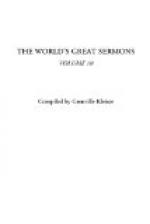Charles Edward Jefferson was born at Cambridge, Ohio, in 1860. He came to public attention by the effectiveness of his preaching during a most successful pastorate in Chelsea, Mass., from which he was called to the Broadway Tabernacle, New York, in 1897. During his New York pastorate the Tabernacle at 34th Street has been sold and a unique structure, including an apartment tower ten stories high, has been built farther up-town. Dr. Jefferson has published several successful books. He has a mellow, sympathetic voice, of considerable range and flexibility, and he speaks in an easy, conversational style.
JEFFERSON
Born in 1860
THE RECONCILIATION[1]
[Footnote 1: Reprinted by permission from “Doctrine and Deed,” Copyright, 1901, by Thomas Y. Crowell & Co.]
Christ died for our sins.—1 Cor. xv., 3.
I want to think with you this morning about the doctrine of the Atonement. Having used that word atonement once, I now wish to drop it. It is not a New Testament word, and is apt to lead one into confusion. You will not find it in your New Testament at all, providing you use the Revised Version. It is found in the King James Version only once, and that is in the fifth chapter of Paul’s letter to the Romans; but a few years ago, when the revisers went to work, they rubbed out the word and would allow it no place whatever in the entire New Testament. They substituted for it a better word—reconciliation—and that is the word that will probably be used in the future theology of the Church. It is my purpose, then, this morning, to think with you about the doctrine of the reconciliation, or, to put it in a way that will be intelligible to all the boys and girls, I want to think with you about the “making up” between God and man.
Christianity is distinctly a religion of redemption. Its fundamental purpose is to recover men from the guilt and power of sin. All of its history and its teachings must be studied in the light of that dominating purpose. We are told sometimes that Jesus was a great teacher, and so He was, but the apostles never gloried in that fact. We are constantly reminded that He was a great reformer, and so He was, but Peter and John and Paul seemed to be altogether unconscious of that fact. It is asserted that He was a great philanthropist, a man intensely interested in the bodies and the homes of men, and so of course He was, but the New Testament does not seem to care for that. It has often been declared that He was a great martyr, a man who laid down His life in devotion to the truth, and so He was and so He did, but the Bible never looks at Him from that standpoint or regards Him in that light. It refuses to enroll Him among the teachers or reformers or philanthropists or the martyrs of our race. According to the apostolic writers, Jesus is the world’s Redeemer, He was manifested to take away sin. He is the Lamb of God that taketh away the sin of the world. The vast and awful fact that broke the apostles’ hearts and sent them out into the world to baptize the nations into His name, was the fact which Paul was all the time asserting, “He died for our sins.”




